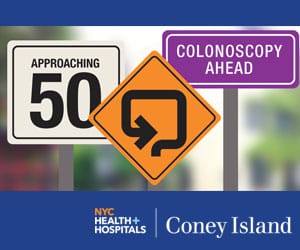Believe Me When I Say, Colonoscopies Are Critical (Sponsored)


March is Colorectal Cancer Awareness Month, a reminder to all New Yorkers that the risk of colon cancer can be greatly reduced by getting a colonoscopy. In New York City, according to the New York Citywide Colon Cancer Control Coalition (C5), which includes the NYC Health + Hospitals, colorectal cancer is the second deadliest cancer, killing approximately 1,400 people each year. If caught early, ninety percent of colorectal cancers are curable.

As a gastroenterologist practicing at NYC Health + Hospitals/Coney Island, I’ve seen a promising trend in colon cancer awareness, diagnosis, and treatment – but we must push to do better. However, my experience with colon cancer is not just from a medical perspective. I speak to you as a patient, as I recently had a colonoscopy myself. And unfortunately, I also speak to you as a person who lost a loved one to colon cancer. That is why I strongly urge all New Yorkers 50 and older to get a colonoscopy once every 10 years. Those with a family history of colorectal cancer, like myself, should discuss with their physician whether they should be screened younger than 50.
Here in Brooklyn we serve a diverse population of patients and I’m glad to say colon cancer awareness and the work of the C5 coalition in NYC has helped close the disparity in colon cancer screening rates that exists in most other parts of the country among blacks, whites, Asians and Hispanics. In New York City, the colonoscopy screening rate is now the same across ethnic groups. Patients in Brooklyn are more aware of colon cancer and the screenings available to prevent it. Just last year, Brooklyn hospitals in our health care system performed more than 7,500 colonoscopies!

Those with colon cancer often have no symptoms until the disease has reached advanced stages, and by the time symptoms present, treatment can be difficult or ineffective. Signs of colon cancer may include:
- A change in bowel habits, including diarrhea, constipation or a change in consistency of stool
- Rectal bleeding or blood in stool
- Persistent abdominal discomfort, such as cramps, gas or pain
- A feeling that the bowel does not completely empty after a bowel movement
- Weakness or fatigue
- Unexplained weight loss
If you are at the recommended age for a colonoscopy or have family history of colorectal cancer, I urge you to reduce your risk of colon cancer and schedule your colonoscopy. Affordable colonoscopies are available at all 11 public hospitals. Visit www.nychealthandhospitals.org or call 311 to find an NYC Health + Hospitals location near you.
This article is part of a series about resources available to residents at NYC Health + Hospitals/Coney Island.




